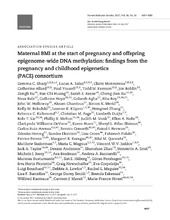| dc.contributor.author | Sharp, Gemma C | en_US |
| dc.contributor.author | Salas, Lucas A | en_US |
| dc.contributor.author | Monnereau, Claire | en_US |
| dc.contributor.author | Bohlin, Jon | en_US |
| dc.contributor.author | Page, Christian | en_US |
| dc.contributor.author | Lie, Rolv T. | en_US |
| dc.contributor.author | Magnus, Maria Christine | en_US |
| dc.contributor.author | Munthe-Kaas, Monica Cheng | en_US |
| dc.contributor.author | Nystad, Wenche | en_US |
| dc.date.accessioned | 2018-01-04T13:24:28Z | |
| dc.date.available | 2018-01-04T13:24:28Z | |
| dc.date.issued | 2017-10 | |
| dc.Published | Sharp GC, Salas LA, Monnereau C, Bohlin J, Page C, Lie RT, Magnus MC, Munthe-Kaas MC, Nystad W. Maternal BMI at the start of pregnancy and offspring epigenome-wide DNA methylation: findings from the pregnancy and childhood epigenetics (PACE) consortium. Human Molecular Genetics. 2017;26(20):4067-4080 | eng |
| dc.identifier.issn | 0964-6906 | |
| dc.identifier.issn | 1460-2083 | |
| dc.identifier.uri | https://hdl.handle.net/1956/17124 | |
| dc.description.abstract | Pre-pregnancy maternal obesity is associated with adverse offspring outcomes at birth and later in life. Individual studies have shown that epigenetic modifications such as DNA methylation could contribute. Within the Pregnancy and Childhood Epigenetics (PACE) Consortium, we meta-analysed the association between pre-pregnancy maternal BMI and methylation at over 450,000 sites in newborn blood DNA, across 19 cohorts (9,340 mother-newborn pairs). We attempted to infer causality by comparing the effects of maternal versus paternal BMI and incorporating genetic variation. In four additional cohorts (1,817 mother-child pairs), we meta-analysed the association between maternal BMI at the start of pregnancy and blood methylation in adolescents. In newborns, maternal BMI was associated with small (<0.2% per BMI unit (1 kg/m2), P < 1.06 × 10−7) methylation variation at 9,044 sites throughout the genome. Adjustment for estimated cell proportions greatly attenuated the number of significant CpGs to 104, including 86 sites common to the unadjusted model. At 72/86 sites, the direction of the association was the same in newborns and adolescents, suggesting persistence of signals. However, we found evidence for acausal intrauterine effect of maternal BMI on newborn methylation at just 8/86 sites. In conclusion, this well-powered analysis identified robust associations between maternal adiposity and variations in newborn blood DNA methylation, but these small effects may be better explained by genetic or lifestyle factors than a causal intrauterine mechanism. This highlights the need for large-scale collaborative approaches and the application of causal inference techniques in epigenetic epidemiology. | en_US |
| dc.language.iso | eng | eng |
| dc.publisher | Oxford University Press | eng |
| dc.relation.uri | https://academic.oup.com/hmg/article-lookup/doi/10.1093/hmg/ddx290 | |
| dc.rights | Attribution CC BY | eng |
| dc.rights.uri | http://creativecommons.org/licenses/by/4.0/ | eng |
| dc.title | Maternal BMI at the start of pregnancy and offspring epigenome-wide DNA methylation: findings from the pregnancy and childhood epigenetics (PACE) consortium | en_US |
| dc.type | Peer reviewed | |
| dc.type | Journal article | |
| dc.date.updated | 2017-11-02T09:22:12Z | |
| dc.description.version | publishedVersion | en_US |
| dc.rights.holder | Copyright 2017 The Author(s) | |
| dc.identifier.doi | https://doi.org/10.1093/hmg/ddx290 | |
| dc.identifier.cristin | 1510144 | |
| dc.source.journal | Human Molecular Genetics | |

